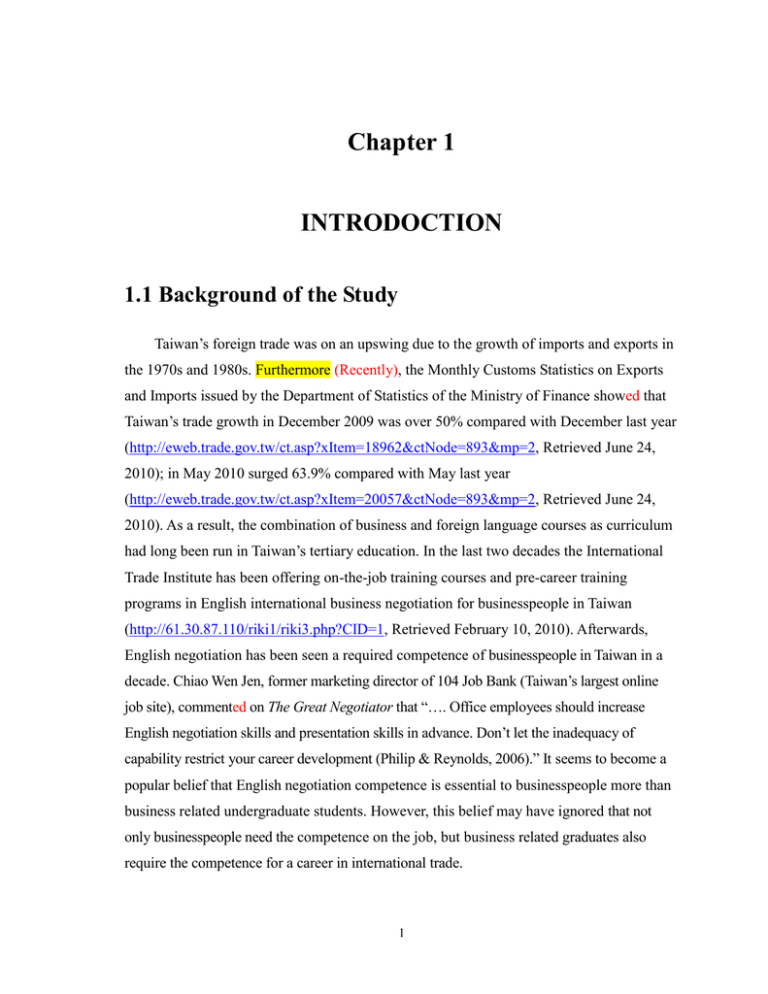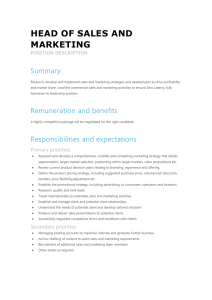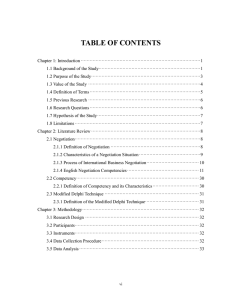Chapter 1 INTRODOCTION 1.1 Background of the Study
advertisement

Chapter 1 INTRODOCTION 1.1 Background of the Study Taiwan’s foreign trade was on an upswing due to the growth of imports and exports in the 1970s and 1980s. Furthermore (Recently), the Monthly Customs Statistics on Exports and Imports issued by the Department of Statistics of the Ministry of Finance showed that Taiwan’s trade growth in December 2009 was over 50% compared with December last year (http://eweb.trade.gov.tw/ct.asp?xItem=18962&ctNode=893&mp=2, Retrieved June 24, 2010); in May 2010 surged 63.9% compared with May last year (http://eweb.trade.gov.tw/ct.asp?xItem=20057&ctNode=893&mp=2, Retrieved June 24, 2010). As a result, the combination of business and foreign language courses as curriculum had long been run in Taiwan’s tertiary education. In the last two decades the International Trade Institute has been offering on-the-job training courses and pre-career training programs in English international business negotiation for businesspeople in Taiwan (http://61.30.87.110/riki1/riki3.php?CID=1, Retrieved February 10, 2010). Afterwards, English negotiation has been seen a required competence of businesspeople in Taiwan in a decade. Chiao Wen Jen, former marketing director of 104 Job Bank (Taiwan’s largest online job site), commented on The Great Negotiator that “…. Office employees should increase English negotiation skills and presentation skills in advance. Don’t let the inadequacy of capability restrict your career development (Philip & Reynolds, 2006).” It seems to become a popular belief that English negotiation competence is essential to businesspeople more than business related undergraduate students. However, this belief may have ignored that not only businesspeople need the competence on the job, but business related graduates also require the competence for a career in international trade. 1 According to the course running statistics on negotiation course searched from Technological and Vocational Education Course Resource website (whose statistics are referred from the Department of Statistics), over 60% of Taiwan’s total universities and colleges ran courses titled ‘negotiation in international business’ or ‘English for business negotiation’ to business related majors in 2008 and 2009 academic years (see Figure 1.1). Also, Taiwan’s negotiation courses offered to business related majors (mostly are in the departments of international business, business administration, and applied English, etc.) in universities of technology reached a high of 88%, better than Universities’ 66% (see Figure 1.2). English negotiation in international business is a regular elective in Taiwan’s universities and colleges, and more than half those majors take advanced negotiation electives. The reality is that business related graduates in Taiwan have very probable chances of English negotiation when they go into international business. However, relatively few English negotiating teachers so far seem to have considered (consider) whether their students’ English negotiation competence meets the demand of the Taiwan’s business community. Figure 1.1. Percentage of Taiwan’s total universities and colleges running negotiation courses, 2008 - 2009 academic years. 66% 65% 64% 63% 62% 61% 60% negotiation course 2008 Acdemic Year 2009 Acdemic Year 65% 62% 2 Figure 1.2. Percentage of each Taiwan’s university system running negotiation courses, 2009 academic year. 90% 80% 70% 60% 50% 40% 30% 20% 10% 0% negotiation course University 66% University of Technology 88% College Junior College 48% 13% 1.2 Purpose of the Study This research aims to find what English negotiation competencies are required for business related graduates of Taiwan’s technological universities are, due to the fact that those graduates get into two common situations when they work for international business in companies. For one thing, every company exists in a web of relationships. Those graduates will spend their time in negotiation activities. For international business, they will negotiate official business with supervisors, subordinates and colleagues in different departments; purchasing and outsourcing contracts with suppliers; contents of product and service with customers; and marketing arrangements with distributors and unions; and product development pacts with joint-venture partners (The Society for Human Resource Management, 2005; Ertel, 1999). This is illustrated by Figure 1.3. They also face a challenge of creating long-term cooperative relationships among these people. For another, those graduates as businesspeople have responsibility to reach business agreements with foreign partners (those who mostly speak English), and English negotiation is one of the main requirements to business agreements (Huang, 2009). As Vicent Hong (general counsel of ASUSTeK Computer Inc.) mentions (ed), businesspeople should use precise words in 3 English international business negotiation in order to acquire best interests for their company. The use of words (languge is) related completely to an ability of cross-language and cross-culture. Any selection of words is likely to greatly influence company’s future rights and interests (http://www.businessweekly.com.tw/article.php?id=28422&p=2, Retrieved June 24, 2010). Figure 1.3. A web of relationships between a graduate and others in a company From Watkins, M. (2002). Breakthrough business negotiation: A toolbox for managers. San Francisco: Jossey Bass. 1.3 Value of the Study With the purpose in mind, the research results may help three types of people. First, business related graduates of Taiwan’s universities of technology better meet the requirement of English negotiation competencies. Second, English negotiating teachers of Taiwan’s universities of technology further design a competency-based English negotiation curriculum plan to equip those graduates for a career in international business. And finally, Taiwan’s trading companies may examine whether college graduates are qualified to do the 4 work in a particular position such as sales and marketing. 1.4 Definition of Terms Definition of two main terms used in this research is defined here. They are: 1. Negotiation. It is the process of discussion and give-and-take between two or more parties who work together to find a mutually acceptable resolution of one or more issues, such as a commercial transaction, a contract, or a deal of any sort (Cohen, 2002). In literature, sometimes ‘bargaining’ and ‘negotiation’ are used interchangeably. But in our research, B (b)argaining is more like haggling, or is so-called competitive bargaining or distributive bargaining, or refers to win-lose negotiation. Here, the objective of the parties is to maximize their own benefit which is often at the expense of the other party. Everybody wants to maximize his share of limited or fixed resources. Therefore, parties are more competitive and opportunistic. On the other hand, negotiation is more like problem-solving, is called integrative bargaining, or refers to win-win negotiation. Both parties perceive negotiation is to find a solution to a common problem. Everybody achieves their objectives and one party’s gain does not depend on the other party’s concession. Parties therefore all win (Ghauri & Usunier, 2003). 2. Competencies. They are “behaviours that individuals demonstrate when undertaking job-relevant tasks effectively within a given organizational context (Whiddett & Hollyforde, 2003).” Some dictionaries may present ‘competence’ and ‘competency’ interchangeably. However, competence refers to a skill or the standard of performance reached from the job or role while competency focuses manner of behavior observed in effective people (Sanghi, 2004). 5 1.5 Previous Research In research on necessity of English negotiation competence, Liao (2006) has indicated that a majority of applied English majors of Taiwan’s universities of technology consider it is necessary to take English negotiation courses, for it helps them prepare for a career in international business. Similarly, it is equally necessary to those who major in business. Although growing numbers of researchers study the significance of negotiation competencies in business, for example, Chiu’s (2006) negotiation competencies needed by top managers of Taiwan’s trading companies, very little attention has been specifically paid to business related graduates of Taiwan’s universities of technology, that is, those graduates’ English negotiation competencies. Besides, Chiu (2006) conducts (ed) a Delphi technique in her study, while we use a modified Delphi technique in this research. 1.6 Research Questions Following are the objectives of the research we will try to achieve. 1. What English negotiation competencies should business related graduates of Taiwan’s universities of technology have? 2. Is there any significant difference between English negotiation competencies required for Taiwan’s universities of technology and participants’ gender? 3. Is there any significant difference between English negotiation competencies required for Taiwan’s universities of technology and participants’ negotiation experiences? 4. Is there any significant difference between English negotiation competencies required for Taiwan’s universities of technology and participants’ English speaking ability? 6 1.7 Hypothesis of the Study We can deduce from the observed phenomenon that what English negotiation competencies are required for business related graduates of Taiwan’s universities of technology. To achieve this, we hypothesize that there is no significant difference in the perspective on English negotiation competencies required for business related graduates of Taiwan’s universities of technology between teachers and businesspeople. If the hypothesis is tested true, the stability of the results is reached. Then we accept the research results which are applicable to all business related graduates of Taiwan’s universities of technology. 1.8 Limitations Three possible limits of survey during Delphi process are as follows: 1. The panel of the experts is designed to half veteran teachers of Taiwan’s universities of technology who teach English negotiation and half businesspeople in Taiwan who masters in English negotiating (ion). These experts willing to participate are sampled by qualified selection. Thus, the validity of the research results might decrease. 2. English negotiation competencies are required for business related graduates who graduates only from Taiwan’s universities of technology, so the research results can not generally apply to other schools. 3. The panel of the experts is only sampled in Taiwan, so the results are not generally applicable to other trade-oriented countries. 7




